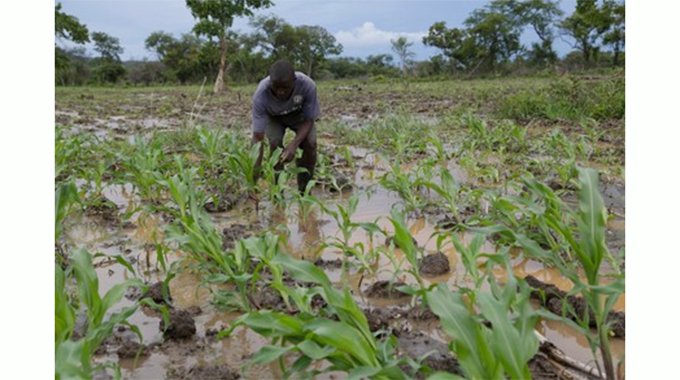Farmers advised to safeguard crops from leaching

Precious Manomano-Herald Reporter
Farmers have been urged to work closely with agricultural extension workers in their areas to devise ways, such as improving ridging and making sure waterlogged areas are drained properly, to minimise leaching of nutrients as heavy rains continue to fall.
There have been near continuous rains since the start of the month with summer crops in some areas now showing signs of nutrient deficiency and most farmers complaining of excessive rainfall, although there are areas where farmers are more worried about too little rain. Careful management can moderate or minimise leaching.
Tobacco Farmers’ Union Trust president Mr Victor Mariranyika said excessively wet conditions in some areas was negatively affecting crop growth with farmers reporting leaching as a major problem.
“Incessant rains or abnormally high amounts of rain can leach nutrients, especially nitrogen, from the soil. Nitrogen added to the soil in the form of granular fertiliser is especially vulnerable to leaching,” he said. “And if this occurs, farmers either have to incur the additional cost of reapplying fertiliser or experience the reduction in crop yield associated with nutrient deficiency.”
In light of the growing problem of leaching, Mr Mariranyika said it was vital for farmers to work closely with agricultural extension workers to minimise losses and boost yields.
He also said tobacco leaching can be mitigated through reridging so that nutrients cannot be washed away.
“When faced with this problem we normal call on our farmers to pay particular attention to how and when they apply the amount of nitrogen fertiliser to meet crop requirement,” he said. “Farmers should carefully work out the amount of nitrogen fertiliser needed for each crop in each field by splitting or spacing the application of fertiliser in their fields.
Apart from this, farmers can re-apply fertiliser to their crops, but this tends to increase their production cost.” Leaching of soils, he said, varied from one place to another and working closely with agricultural extension workers could help farmers deal with this problem depending on soil types and other agro-ecological conditions.
Zimbabwe Commercial Farmers’ Union president Dr Shadreck Makombe said farmers should drain away water or make contour ridges to protect crops from leaching.
“Farmers should drain away water that occurred as a result of water logging. Action is needed to ensure that crops are well protected from excessive rainfall. Water harvesting can also be practised, shallow wells are also critical at this stage. A bad situation can be turned into a good situation. Farmers need to find ways to drain away water that may cause leaching,” he said.
Zimbabwe Indigenous Women Farmers’ Association Trust president, Mrs Depinah Nkomo said leaching has not so far affected many places, adding that more rainfall is still needed in some parts of the country.
“So far so good in most places. It depends with the type of soil. Some places have received normal rainfall and we are still looking forward to receive more rainfall. Loose soils are easily affected by too much rains,” she said.
Maintaining an appropriate level of soil fertility by the careful use of fertilisers, organic manures and lime will help to maximise the profitability of farming systems.
Agricultural experts estimate that 80 percent of arable land in Africa has low soil fertility and suffers from physical soil degradation as a result of massive nutrient loss caused by unsustainable soil management practices. Nitrogen is responsible for crop growth and yields obtained in agricultural production. It is also the most limiting nutrient to plant growth in smallholder farms in Africa due to its susceptibility losses resulting from leaching and runoff or erosion, among other factors.
Meteorological Services Department has recently said they are expecting more rains to come since we are in the middle of the rainy season.








Comments